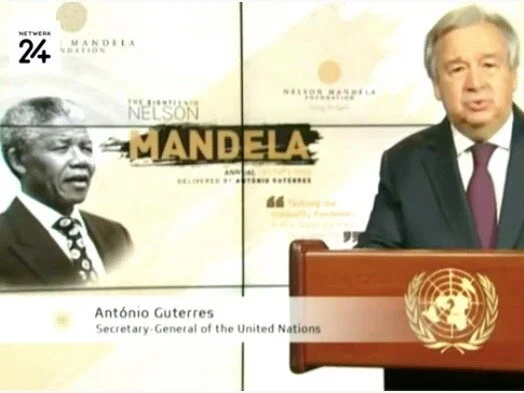U.N. head strikes at inequality
In Mandela lecture, Guterres calls for New Social Contract, New Global Deal
U.N. Secretary-General Antonio Guterres delivers the Nelson Mandela Annual Lecture. (YouTube)
By Ted Cox
The head of the United Nations called for global efforts to address social and economic inequality in giving an annual lecture this weekend celebrating Nelson Mandela.
U.N. Secretary-General Antonio Guterres delivered the Nelson Mandela Annual Lecture from New York City on Saturday. Applauding the South African leader for having “devoted his life to fighting the inequality that has reached crisis proportions around the world in recent decades — and that poses a growing threat to our future,” Guterres drew attention to “the many mutually reinforcing strands and layers of inequality, before they destroy our economies and societies.”
Pointing out that “more than 70 percent of the world’s people are living with rising income and wealth inequality,” that “between 1980 and 2016, the world’s richest 1 per cent captured 27 per cent of the total cumulative growth in income,” and that “the 26 richest people in the world hold as much wealth as half the global population,” Guterres said, “Inequality defines our time.”
He added, “COVID-19 is shining a spotlight on this injustice. The world is in turmoil. Economies are in freefall. We have been brought to our knees — by a microscopic virus. The pandemic has demonstrated the fragility of our world. It has laid bare risks we have ignored for decades: inadequate health systems; gaps in social protection; structural inequalities; environmental degradation; the climate crisis. Entire regions that were making progress on eradicating poverty and narrowing inequality have been set back years, in a matter of months. The virus poses the greatest risk to the most vulnerable: those living in poverty, older people, and people with disabilities and pre-existing conditions.”
Comparing the pandemic to “an x-ray, revealing fractures in the fragile skeleton of the societies we have built,” Guterres said, “It is exposing fallacies and falsehoods everywhere: the lie that free markets can deliver health care for all; the fiction that unpaid care work is not work; the delusion that we live in a post-racist world; the myth that we are all in the same boat.”
Although many might suggest we are all in the same boat, and thus the need for reforms, Guterres explained that “while we are all floating on the same sea, it’s clear that some are in superyachts while others are clinging to drifting debris.” He later added, “We are sometimes told a rising tide of economic growth lifts all boats. But in reality, rising inequality sinks all boats.”
Guterres called for universal health care, but also mentioned “the possibility of a Universal Basic Income.”
Declaring that “inequality starts at the top, in global institutions,” Guterres insisted, “Addressing inequality must start by reforming them.” He especially called for investment in education, not just higher education but also preschool.
Quoting Mandela’s own words that “education is the most powerful weapon we can use to change the world,” Guterres added, “Governments must prioritize equal access, from early learning to lifelong education.”
Drawing parallels between the U.S. protests in the feminist Me Too movement and Black Lives Matter, Guterres said, “Women everywhere have called time on one of the most egregious examples of gender inequality: violence perpetrated by powerful men against women who are simply trying to do their jobs,” while “the anti-racism movement that has spread from the United States around the world in the aftermath of George Floyd’s killing is one more sign that people have had enough — enough of inequality and discrimination that treats people as criminals on the basis of their skin color, enough of the structural racism and systematic injustice that deny people their fundamental human rights.”
Guterres said, “COVID-19 is a human tragedy. But it has also created a generational opportunity — an opportunity to build back a more equal and sustainable world.” He said climate change and the rise of digital technology also created an environment to effect change, although he also warned it was fraught with pitfalls that could worsen inequality around the world.
“The response to the pandemic, and to the widespread discontent that preceded it, must be based on a New Social Contract and a New Global Deal that create equal opportunities for all and respect the rights and freedoms of all,” Guterres said. “A New Social Contract within societies will enable young people to live in dignity; will ensure women have the same prospects and opportunities as men; and will protect the sick, the vulnerable, and minorities of all kinds.” Meanwhile, “A New Global Deal, based on a fair globalization, on the rights and dignity of every human being, on living in balance with nature, on taking account of the rights of future generations, and on success measured in human rather than economic terms, is the best way to change” inequality.
Guterres also called for a global tax policy to discourage tax cheats, echoing proposals made by French economist Thomas Piketty, saying, “Tax concessions, tax avoidance, and tax evasion remain widespread. Corporate tax rates have fallen.”
The UN secretary-general said the COVID-19 pandemic had offered a painful reminder that “we belong to each other. We stand together, or we fall apart.”
He concluded, “Today, in demonstrations for racial equality, in campaigns against hate speech, in the struggles of people claiming their rights and standing up for future generations, we see the beginnings of a new movement. This movement rejects inequality and division, and unites young people, civil society, the private sector, cities, regions, and others behind policies for peace, our planet, justice. and human rights for all. It is already making a difference.”

